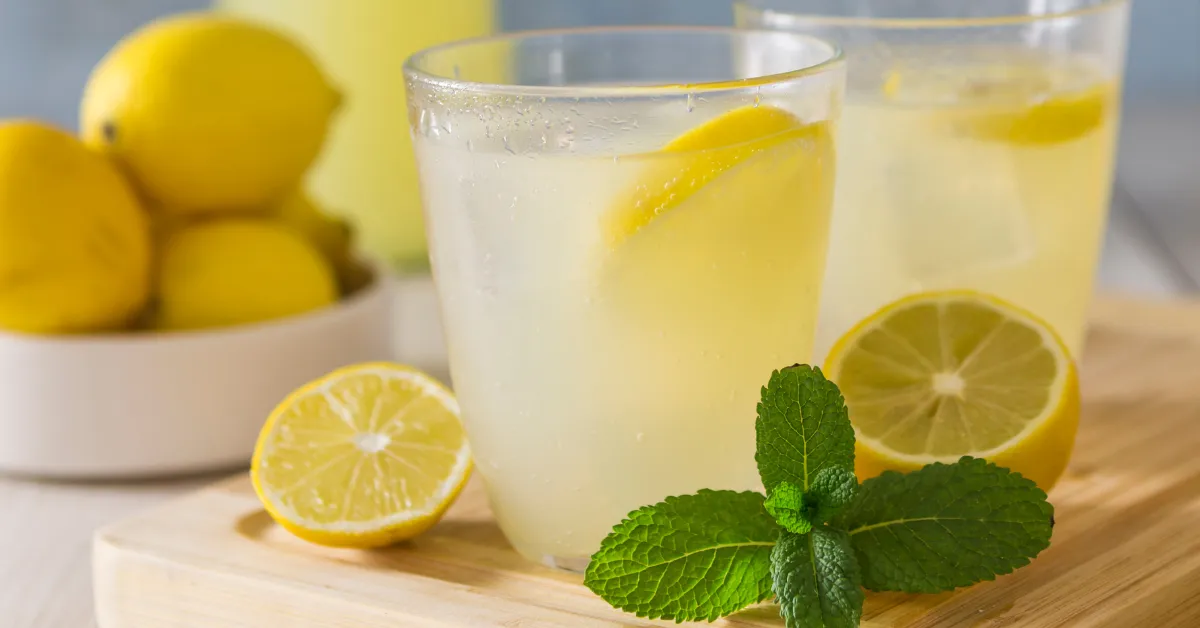Lemonade, a classic summer refreshment, has been enjoyed by many for centuries. From its humble beginnings as a simple mixture of lemon juice, sugar, and water, it has evolved into a global phenomenon. Enter fair lemonade, a twist on the traditional drink that emphasizes ethical sourcing and production. This article will take you on a journey through the world of fair lemonade, exploring its origins, benefits, and why it’s making waves in the beverage industry.
History of Lemonade
The origins of lemonade can be traced back to ancient Egypt, where it was made using lemon juice mixed with sugar. Over the years, it spread across continents, with each region adding its unique touch. From the sweet and tangy Indian ‘nimbu pani’ to the fizzy lemonades of Europe, this drink has been a favorite for many.
Evolution to Fair Lemonade
The concept of ‘fair’ in fair lemonade refers to the ethical sourcing of ingredients and ensuring that producers get a fair share of the profits. With the rise of conscious consumerism, people began to demand more transparency in their products, leading to the birth of fair lemonade.
Fair Lemonade Recipe
Fair lemonade is not just a refreshing beverage; it’s a drink with a conscience. Rooted in ethical sourcing and sustainable practices, the making of fair lemonade goes beyond just mixing lemon, sugar, and water. It’s about ensuring that every step of the process, from the farm to your glass, is done with integrity and care. Let’s delve into the journey of creating this delightful drink.
Ingredients for Fair Lemonade
- Ethically Sourced Lemons: The heart of any lemonade is, of course, the lemons. For fair lemonade, these lemons are sourced from farms that adhere to sustainable farming practices. This means no harmful pesticides or chemicals are used, ensuring the fruit is as natural and organic as possible.
- Fair Trade Sugar: Sugar adds sweetness to the lemonade. In the case of fair lemonade, this sugar is often sourced from fair trade suppliers. This ensures that the farmers producing the sugar are paid a fair wage, promoting better living conditions and discouraging exploitative labor practices.
- Pure Water: Clean, purified water is essential to bring out the authentic taste of the lemonade. It’s the canvas on which the flavors of lemon and sugar dance.
Step-by-step Preparation Process
- Squeeze the Lemons: Begin by squeezing the fresh, ethically sourced lemons to extract the juice. Depending on your taste, you can adjust the amount of juice you want in your lemonade.
- Add Fair Trade Sugar: To the lemon juice, add the fair trade sugar. Stir well until the sugar is completely dissolved. The amount of sugar can be adjusted based on how sweet you want your lemonade to be.
- Mix with Water: Pour in the purified water and give it a good mix. Ensure that the lemon and sugar blend well with the water, creating a harmonious flavor.
- Chill and Serve: For the best taste, refrigerate the lemonade for a couple of hours before serving. Once chilled, pour it into glasses, add a few ice cubes, and enjoy your refreshing fair lemonade!
Making fair lemonade is not just about quenching your thirst; it’s about making a choice that benefits the environment, supports farmers, and promotes ethical practices. Every sip of fair lemonade is a testament to a better, more sustainable world. So, the next time you’re in the mood for a drink, make it a fair lemonade and toast to a brighter future!
Benefits of Drinking Fair Lemonade
Fair lemonade is not just a refreshing drink; it’s a blend of taste, health, and ethics. Let’s delve into the myriad benefits of this delightful beverage.
Nutritional Value
Fair lemonade is packed with essential nutrients that our body craves. Made from organically grown lemons, it is rich in vitamin C, which boosts our immune system and rejuvenates our skin. Additionally, the natural sugars provide a quick energy boost without the harmful effects of artificial sweeteners.
Health Benefits
Beyond its nutritional value, fair lemonade offers a plethora of health benefits. The antioxidants present in lemons help in combating free radicals, reducing the risk of chronic diseases. Moreover, the citric acid aids in digestion, making it an excellent choice for a post-meal drink. Regular consumption can also lead to improved hydration and better skin health.
Environmental Impact
Choosing fair lemonade over its conventional counterpart is a step towards a sustainable future. The ethical sourcing ensures that the environment is not harmed during the production process. By supporting fair practices, we contribute to reduced pesticide use, better soil health, and decreased water wastage.
In conclusion, fair lemonade is more than just a drink; it’s a statement. A statement that we care about our health, the environment, and the well-being of the farmers who work tirelessly to bring us this delightful beverage. So, the next time you’re thirsty, make the ethical choice and reach for a glass of fair lemonade.
Fair Lemonade vs. Regular Lemonade
Lemonade, with its tangy sweetness, has been a beloved beverage for centuries. However, as consumers become more conscious of their choices and their impact on the world, a new variant has emerged: fair lemonade. But how does it stack up against the traditional, regular lemonade we all know? Let’s dive into the differences between fair lemonade and regular lemonade.
Ethical Sourcing and Production
Fair Lemonade: The term “fair” in fair lemonade primarily refers to the ethical sourcing of its ingredients. This means that the lemons and sugar used in its production come from farms and suppliers that adhere to fair trade principles. These principles ensure that farmers and workers receive fair wages, work in safe conditions, and employ sustainable farming practices.
Regular Lemonade: Regular lemonade, on the other hand, might not always prioritize ethical sourcing. The ingredients could come from various sources, and there’s no guarantee that the farmers or workers involved were treated or paid fairly.
Taste and Quality
Fair Lemonade: Many advocates of fair lemonade claim that it tastes fresher and more authentic. This could be attributed to the organic and ethically sourced ingredients, which are often of higher quality. The absence of harmful pesticides and chemicals can also contribute to a cleaner, more natural taste.
Regular Lemonade: While regular lemonade can still be delicious, its taste might vary depending on the quality and source of its ingredients. Some mass-produced versions might use artificial flavors or preservatives, which can alter the natural taste of lemonade.
Environmental Impact
Fair Lemonade: One of the hallmarks of fair lemonade is its commitment to sustainability. The farms from which its ingredients are sourced often employ eco-friendly practices, such as water conservation, soil preservation, and reduced use of chemicals. This means that choosing fair lemonade can have a smaller carbon footprint.
Regular Lemonade: The environmental impact of regular lemonade can be more varied. If its ingredients come from large-scale farms that use intensive farming methods, it might have a more significant environmental toll.
Price Point
Fair Lemonade: Due to the ethical sourcing and higher quality ingredients, fair lemonade might come with a slightly higher price tag. However, many consumers are willing to pay a premium for a product that aligns with their values and offers a superior taste.
Regular Lemonade: Typically, regular lemonade might be more affordable. However, the lower price might come at the cost of quality, taste, and ethical considerations.
Summary
While both fair lemonade and regular lemonade serve the primary purpose of quenching thirst with a delightful tangy-sweet beverage, they represent different values and priorities. Fair lemonade stands for ethical practices, superior quality, and environmental sustainability. In contrast, regular lemonade offers a more traditional and potentially more affordable option. The choice between the two boils down to personal preferences and values. Whether you prioritize taste, ethics, or price, there’s a lemonade out there for everyone!
Fair Lemonade in Culinary Arts
The culinary world is ever-evolving, with chefs and food enthusiasts constantly seeking innovative ways to incorporate unique ingredients into their dishes. Fair lemonade, with its ethical sourcing and refreshing taste, has found its way into the heart of modern cuisine. Let’s explore how this delightful beverage is making waves in the culinary arts.
Using Fair Lemonade in Dishes
Fair lemonade isn’t just for sipping on a hot summer day; it’s a versatile ingredient that can elevate a variety of dishes. Its tangy flavor can be used to marinate poultry or seafood, giving them a zesty kick. In salads, a splash of fair lemonade in the dressing can add a refreshing twist. Desserts, too, benefit from its citrusy notes, with lemonade-infused sorbets and tarts becoming increasingly popular.
Cocktail Recipes with Fair Lemonade
The world of mixology has warmly embraced fair lemonade. Bartenders are crafting innovative cocktails that highlight the beverage’s ethical roots and tantalizing taste. A classic “Fair Lemonade Mojito” combines the drink with mint, rum, and a touch of soda, creating a cocktail that’s both refreshing and responsible. Another popular concoction is the “Lemonade Sangria,” where fair lemonade is mixed with white wine, fresh fruits, and a hint of brandy, offering a delightful drink that’s perfect for brunches and evening soirees.
In conclusion, fair lemonade’s journey in the culinary arts is a testament to its versatility and appeal. Whether it’s in a gourmet dish or a crafted cocktail, this ethically sourced beverage is proving that taste and responsibility can indeed go hand in hand.
Related:
The Global Impact of Fair Lemonade

In today’s interconnected world, the choices we make as consumers can have far-reaching consequences. One such choice that’s making waves globally is the preference for fair lemonade. But what exactly is the global impact of this ethically-produced beverage? Let’s explore the ripple effects of choosing fair lemonade over its conventional counterpart.
Supporting Sustainable Farming Practices
Fair Lemonade: By choosing fair lemonade, consumers indirectly support sustainable farming practices. The lemons and sugar used in fair lemonade are often grown without harmful pesticides or chemicals. This not only ensures a healthier drink but also promotes soil health, water conservation, and biodiversity.
Global Impact: Sustainable farming practices help combat the adverse effects of climate change by reducing greenhouse gas emissions. They also ensure that the soil remains fertile for future generations, leading to long-term food security.
Economic Empowerment of Farmers
Fair Lemonade: The “fair” in fair lemonade also refers to fair trade practices. This means that the farmers and workers involved in its production receive a fair wage for their labor, ensuring a decent standard of living.
Global Impact: When farmers are paid fairly, they can invest in their communities, leading to better education, healthcare, and infrastructure. This uplifts entire communities and can break the cycle of poverty in many developing regions.
Promotion of Ethical Consumerism
Fair Lemonade: The rise in popularity of fair lemonade is a testament to the growing trend of ethical consumerism. People are becoming more conscious of where their products come from and the impact of their choices.
Global Impact: As more consumers demand ethically-produced goods, more companies will adopt fair trade and sustainable practices. This can lead to a global shift in production norms, promoting ethics and sustainability across various industries.
Reducing Exploitative Labor Practices
Fair Lemonade: Fair lemonade brands often ensure that there are no exploitative labor practices in their supply chain. This means no child labor, forced labor, or unfair wages.
Global Impact: By supporting products that adhere to these standards, we can reduce the demand for goods produced through exploitation. This can lead to better labor standards worldwide, ensuring dignity and rights for workers everywhere.
Raising Awareness and Setting Precedents
Fair Lemonade: The success of fair lemonade in the market serves as a beacon for other products and industries. It shows that ethical production and profitability can go hand in hand.
Global Impact: As more industries adopt the principles exemplified by fair lemonade, we can expect a global market where ethics, sustainability, and profitability coexist. This sets a precedent for future entrepreneurs and businesses to follow.
Conclusion
The global impact of fair lemonade is profound. It’s not just a beverage; it’s a movement towards a more ethical, sustainable, and just world. Every glass of fair lemonade consumed sends a message to producers, businesses, and policymakers about the kind of world consumers want to see. In the grand scheme of things, it’s a small step, but with significant implications for the future of our planet and its inhabitants.
Related:
How to Choose the Best Fair Lemonade
In today’s market, where consumers are becoming increasingly conscious of their choices, fair lemonade stands out as a beacon of ethical consumption. But with various brands and options available, how does one choose the best fair lemonade? Here’s a guide to help you make an informed decision.
Reading Labels
The first step in choosing the best fair lemonade is to carefully read the labels. Look for certifications that indicate the product is ethically sourced. Certifications like “Fair Trade” or “Organic” are good indicators that the brand prioritizes ethical and sustainable practices.
Price vs. Quality
While it’s tempting to opt for the cheapest option, it’s essential to consider the quality of the product. Fair lemonade might be slightly pricier than its conventional counterparts due to the ethical sourcing and organic ingredients. However, investing in a quality product ensures you’re getting a beverage free from harmful additives and supporting fair practices.
Taste and Freshness
The flavor of the lemonade is paramount. Opt for brands that use real lemon juice rather than artificial flavors. A good fair lemonade should taste fresh, with a perfect balance of sweetness and tartness. Checking the production and expiration dates can also give you an idea of the product’s freshness.
Brand Reputation
Do a quick online search to read reviews and feedback about the brand. Customers’ experiences can provide valuable insights into the product’s taste, quality, and the brand’s commitment to ethical practices.
Packaging
Eco-friendly packaging is a bonus when choosing fair lemonade. Brands that use recyclable or biodegradable packaging show a commitment not only to fair trade practices but also to environmental sustainability.
Local vs. Imported
While imported brands might offer a unique taste, local brands reduce the carbon footprint associated with transportation. If you’re environmentally conscious, you might want to opt for a local brand that offers fair lemonade.
In conclusion, choosing the best fair lemonade requires a bit of research and awareness. By considering the factors mentioned above, you can enjoy a refreshing drink that aligns with your ethical and taste preferences.
Fair Lemonade in Festivals and Events
Festivals and events are a celebration of culture, community, and togetherness. As the world becomes more conscious of ethical choices and sustainability, fair lemonade has emerged as a popular beverage choice in these gatherings. Let’s explore how fair lemonade is making its mark in festivals and events.
Lemonade Stands
The quintessential lemonade stand has been a staple at local fairs and festivals for decades. Today, many of these stands are making the switch to fair lemonade, promoting ethical sourcing and organic ingredients. These stands not only quench the thirst of attendees but also educate them about the importance of making ethical choices.
Incorporating Fair Lemonade in Events
Event organizers are increasingly incorporating fair lemonade into their beverage offerings. Whether it’s a music festival, a community gathering, or a corporate event, fair lemonade is often featured as a premium, ethical choice. Its refreshing taste, combined with its ethical sourcing, makes it a hit among attendees.
Themed Events Around Fair Lemonade
Some festivals are entirely dedicated to promoting ethical products, and fair lemonade often takes center stage at these events. These festivals might feature workshops on sustainable farming, talks on the importance of fair trade, and stalls offering a variety of fair lemonade flavors.
Cocktail Bars and Mixology
At events where alcohol is served, mixologists are crafting innovative cocktails using fair lemonade. These cocktails, with their unique flavors and ethical sourcing, are a hit among attendees looking for a refreshing and responsible drink.
Promotional Campaigns
Brands producing fair lemonade often launch promotional campaigns during major festivals and events. These campaigns might include free sampling, interactive stalls where attendees can learn about the production process, and contests where attendees can win exciting prizes.
Supporting Local Communities
By choosing fair lemonade at festivals and events, organizers support local farmers and communities involved in its production. This not only boosts the local economy but also promotes sustainable and ethical farming practices.
FAQs
How much sugar is in a fair lemonade?
Fair lemonade, like other types of lemonade, can vary in its sugar content based on the recipe and brand. Typically, a standard 8-ounce serving of homemade lemonade can contain anywhere from 20 to 30 grams of sugar. However, fair lemonade brands might adjust this amount, especially if they’re aiming for a healthier or lower-calorie product. It’s always a good idea to check the nutrition label if you’re purchasing a bottled version or, if making at home, adjust the sugar to your preference.
Is lemonade good for kidneys?
Lemonade, particularly when made with real lemon juice, can be beneficial for the kidneys. The citrate in natural lemon juice can help prevent the formation of kidney stones. Drinking lemonade can increase the amount of citrate in the urine, which might prevent the crystallization of calcium salts, one of the main causes of some kidney stones. However, it’s essential to note that while lemonade can be a preventive measure, it’s not a treatment. If you have concerns about kidney health or kidney stones, it’s best to consult with a healthcare professional.
What is the most unhealthy drink?
The term “most unhealthy” can be subjective and depends on various factors like sugar content, artificial additives, and more. However, many nutritionists and health experts often point to sugary sodas and certain energy drinks as among the most unhealthy beverages. These drinks can be high in sugars, caffeine, and other additives, which, when consumed in excess, can lead to health issues like obesity, heart disease, and more. It’s always recommended to consume such drinks in moderation and be mindful of their nutritional content.
What do Jamaicans call lemonade?
In Jamaica, the term “lemonade” often refers to a beverage made from limes rather than lemons, as limes are more commonly available on the island. This drink is similar to what many might consider “limeade.” It’s a refreshing blend of lime juice, sugar, and water. Additionally, in Jamaica, the word “lemon” often refers to what many other places call “lime.” So, when you hear “lemonade” in Jamaica, it’s typically referring to a drink made from limes.
Conclusion
The choices we make as consumers, no matter how small, have the power to shape industries, uplift communities, and pave the way for a more sustainable future. Fair lemonade, while just a beverage at its core, represents a broader movement towards ethical consumerism and conscious decision-making. By opting for products that prioritize fairness, sustainability, and ethical sourcing, we not only enjoy a superior quality product but also contribute to a global shift towards better practices in production and trade.
The popularity of fair lemonade serves as a testament to the changing dynamics of the global market. It’s a beacon of hope, signaling that profitability and ethics can coexist harmoniously. As more individuals become aware of the impact of their choices and demand transparency and ethics in their products, industries worldwide will be compelled to adapt.
In essence, fair lemonade is more than just a refreshing drink. It’s a symbol of progress, a beacon for change, and a reminder that every purchase we make has the potential to create ripples of positive impact. As we move forward, let’s carry the principles exemplified by fair lemonade into other aspects of our lives, championing a world where fairness, sustainability, and prosperity go hand in hand.









